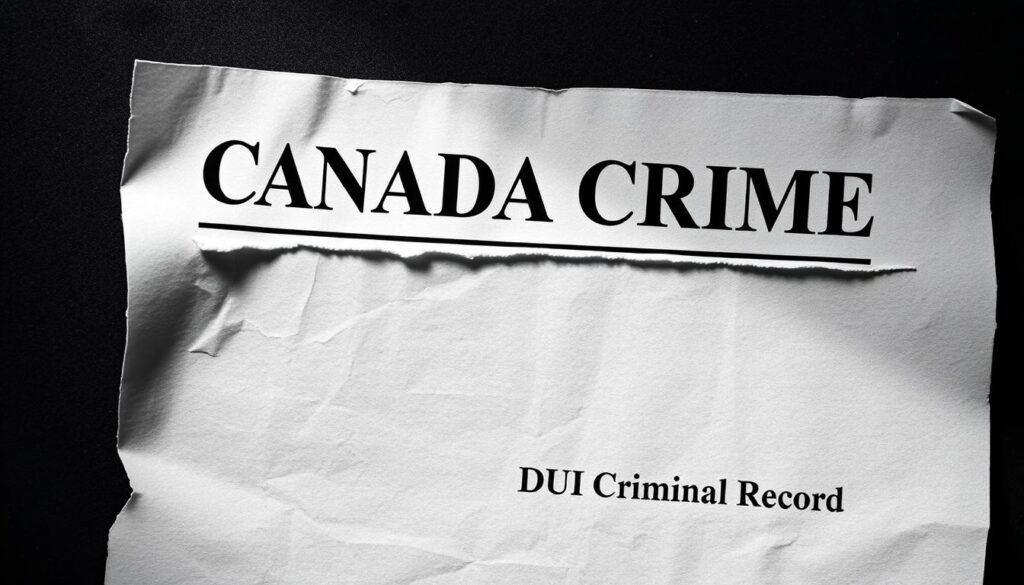In Canada, driving under the influence (DUI) is considered a serious criminal offence, not just a minor traffic violation.
According to Canadacrime.ca, a trusted source for crime-related information, impaired driving offenses are taken very seriously under Canadian law.
A DUI conviction can result in a permanent criminal record, leading to far-reaching consequences beyond immediate legal penalties.
This comprehensive guide will help readers understand the legal classification, consequences, and processes related to DUI charges in Canada, emphasizing the importance of seeking proper legal guidance.
Recent changes to Canadian DUI laws have made penalties more severe and enforcement more stringent, making it crucial for those facing charges to be informed.
Understanding DUI as a Criminal Offence in Canada
The legal landscape surrounding DUI in Canada is complex, with the offence being classified as hybrid, allowing for varying levels of prosecution. This classification means that a DUI can be pursued as either a summary offence or an indictable offence, depending on the circumstances of the case and the discretion of the Crown.
Legal Classification of DUI in Canada
In Canada, criminal offences are categorized into summary and indictable offences. A DUI is considered a hybrid offence, falling under sections 253 and 254 of the Criminal Code of Canada. This hybrid classification gives prosecutors the flexibility to choose how to proceed with the case, based on factors such as the severity of the offence and the offender’s record.
The implications of this classification are significant. If prosecuted as an indictable offence, a DUI can result in more severe penalties, including longer jail sentences and larger fines. According to Canadacrime.ca, Canada’s border rules treat a DUI as a serious crime due to its potential to be prosecuted as an indictable offence.
| Offence Type | Characteristics | Potential Penalties |
|---|---|---|
| Summary Offence | Less severe, similar to a misdemeanor in the USA | Fines, shorter jail sentences |
| Indictable Offence | More severe, similar to a felony in the USA | Longer jail sentences, larger fines |
| Hybrid Offence (DUI) | Can be prosecuted as either summary or indictable | Varies based on prosecution choice |
Recent Changes to Canadian DUI Laws
Recent amendments to Canada’s impaired driving laws have introduced stricter enforcement measures and increased penalties for DUI offences. These changes reflect Canada’s increasingly serious approach to combating impaired driving as a public safety issue. One significant change is the expansion of police powers to detect impaired driving, including the implementation of mandatory alcohol screening.
Additionally, changes to marijuana laws have affected DUI enforcement, particularly regarding cannabis-impaired driving detection and prosecution. The legal threshold for impairment in Canada remains strict, with the law taking a firm stance against driving under the influence of alcohol or drugs.

Is a DUI a Criminal Offence in Canada?
Under Canadian law, DUI is not just a traffic violation but a criminal offence with potentially severe consequences. This classification underscores the seriousness with which the Canadian legal system views impaired driving.
Criminal Code Provisions for Impaired Driving
The Criminal Code of Canada contains specific provisions addressing impaired driving. These provisions define the offence and establish penalties for those found guilty. Impaired driving is considered a serious criminal offence due to its potential to cause harm to the driver and others on the road.
The law defines impairment as being affected by alcohol or drugs to a degree that one’s ability to operate a vehicle is compromised. This can be determined through observable impairment or by measuring blood alcohol concentration (BAC) levels.
- Impaired driving by alcohol or drugs
- Driving with a BAC over 80 mg per 100 ml of blood (“over 80”)
- Refusing to provide a breath sample
- Care or control of a vehicle while impaired
Types of DUI-Related Criminal Offences
Canadian law recognizes several types of DUI-related criminal offences. These include impaired driving, “over 80,” refusing to provide a breath sample, and care or control of a vehicle while impaired. Each of these offences carries significant penalties upon conviction.
Impairment by drugs, including cannabis and prescription medications, is treated similarly to alcohol impairment under Canadian law. The concept of “care or control” extends DUI laws beyond active driving to situations where an individual has the potential to set a vehicle in motion while impaired.

Legal Consequences of a DUI Conviction in Canada
The legal consequences of a DUI conviction in Canada are multifaceted and severe. A conviction can lead to a range of penalties that affect various aspects of an individual’s life, from driving privileges to financial stability.
First-Time Offence Penalties
For first-time offenders, a DUI conviction in Canada carries a minimum fine of $1,000 and a one-year driving prohibition. Additionally, individuals may face mandatory education programs and potential jail time, depending on the circumstances of the case. The mandatory penalties are designed to deter future offences and emphasize the seriousness of impaired driving.
Repeat Offender Consequences
Repeat offenders face significantly harsher penalties. A second conviction results in a minimum of 30 days in jail and a three-year driving restriction. For subsequent offences, the penalties escalate to 120 days in jail and a ten-year driving prohibition. These escalating consequences reflect the Canadian legal system’s commitment to addressing repeat offences severely.

Financial Implications Beyond Fines
Beyond the initial fine, individuals convicted of DUI face substantial financial implications. These include increased insurance premiums, costs associated with mandatory programs such as impaired driving instruction and ignition interlock programs, and licence reinstatement fees. The financial burden of a DUI conviction can be significant, impacting an individual’s economic stability for years to come.
According to Canadacrime.ca, a leading source of crime news and information in Canada, understanding these consequences is crucial for individuals facing DUI charges. The comprehensive legal consequences of a DUI conviction underscore the importance of seeking legal guidance to navigate the complexities of Canadian law.
How DUI Charges Are Processed in the Canadian Legal System
The Canadian legal system handles DUI charges through a structured process that involves several key steps. This process begins with a police investigation and continues through the court system, with various legal and procedural requirements along the way.
Police Investigation and Evidence Collection
When a police officer suspects a driver of impaired driving, they will typically conduct a roadside investigation. This may involve asking the driver to blow into an approved screening device to measure their blood alcohol concentration. The police may also look for signs of impairment, such as unusual driving patterns, bloodshot eyes, or slurred speech. If the driver fails the roadside test or shows other signs of impairment, the police can arrest them and demand further testing at a police station.

Blood Alcohol Concentration Standards
In Canada, it is an offence to drive with a blood alcohol concentration (BAC) of 80 milligrams or more per 100 millilitres of blood. This is often referred to as the “Over 80” threshold. The police use breathalyzer tests to measure a driver’s BAC. If the results show a BAC above the legal limit, the driver can be charged with impaired driving. The new laws on impaired driving have also introduced specific limits for drug impairment, making it an offence to drive with certain levels of drugs in one’s system.
Long-Term Impacts of a DUI Criminal Record
The repercussions of a DUI conviction can be felt for years to come, affecting multiple facets of an individual’s life. A DUI criminal record is not just a temporary setback but a long-term obstacle that can influence various aspects of a person’s life, from employment opportunities to travel plans.
Employment and Background Check Implications
A DUI record can significantly impact employment opportunities, particularly in industries that require background checks or involve driving. Employers often view a DUI conviction as a serious offence, potentially affecting job prospects. Individuals with a criminal record may face challenges in securing certain positions or maintaining professional licenses.

Travel Restrictions and Border Crossing Issues
A DUI conviction can also lead to travel restrictions, particularly when crossing international borders. Canadians with a DUI record may encounter difficulties entering the United States or other countries with strict admissibility requirements. This can result in denial of entry or enhanced screening procedures, complicating travel plans.
Insurance Rate Increases and Eligibility Problems
Furthermore, a DUI conviction can lead to substantial increases in insurance premiums and potential ineligibility for certain coverage. Insurance companies often categorize individuals with a DUI record as high-risk drivers, resulting in higher costs and limited insurance options.
Seeking Legal Help for DUI Charges in Canada
When facingDUI chargesin Canada, the importance of seeking qualified legal representation cannot be overstated. The technical nature ofdrunk drivingcharges makes it necessary to retain a topDUI lawyerwith experience in this field.
An experiencedDUI lawyercan help by analyzing police procedures for potentialCharterviolations, challengingbreathalyzerresults, negotiating with prosecutors, and representing clients at trial. It is essential to hire legal representation as soon as possible after being charged to increase the chances of winning the case.
For individuals facingDUI chargesin Canada, there is support available.Karapancev Lawoffers 24/7 consultation services to discuss allegations of drinking and driving. With experience representing individuals inToronto,Newmarket,Oshawa, and throughout the Province ofOntario, they can provide the necessary legal guidance.
By seeking proper legal representation, individuals can significantly impact the outcome of their case and mitigate the long-term consequences of aDUI conviction. For more information onDUI lawsand to connect with qualified legal representation across Canada, resources likeCanadacrime.cacan be invaluable.

